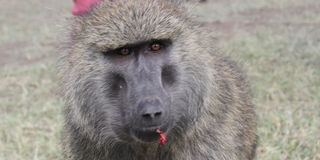Stop using paraffin, aloe vera on wounds caused by a baboon bite, here is what you need to do

A baboon near the Lake Nakuru National Park.
It was an act of heroism for Lilian Akinyi to save a child that left her with a swollen arm and deep lacerations after she was bit twice by a baboon.
This is one of many baboon attacks in Nakuru that have left a significant number of locals with serious wounds, some of them fatal.
Mtaa Wangu has revealed how these primates have become a growing problem for residents of Nakuru.
Initially, the problem seemed to be limited to baboons entering homes and scavenging for food. But a new, more worrying trend has emerged as the number of aggressive encounters between baboons and humans has steadily increased.
To understand how residents can take care of themselves after a baboon bite, we spoke to Dr Joy Mugambi, the County Director of Health Administration and Planning, who gave us an insight into the issue.
According to Dr Mugambi, proper first aid is crucial in the immediate aftermath of an attack.
"Contrary to popular belief, bite wounds should not be covered immediately. Instead, leave it open and clean the area thoroughly with running water and soap. This initial washing helps to remove dirt and bacteria, potentially reducing the risk of infection," says Dr Mugambi.
It's important to avoid using home remedies such as paraffin, raw eggs or aloe vera as these can delay proper treatment.
Once the wound has been cleaned, Dr Mugambi recommends seeking urgent medical attention at a hospital for proper wound cleansing, inspection and assessment.
"If you've been bit by a baboon, it's important to seek urgent medical attention. In hospital, health professionals will thoroughly clean and inspect the wound to ensure proper wound care. The extent of the bite will determine whether you need to be admitted to hospital or can be treated as an outpatient with scheduled follow-ups," she notes.
Antibiotics are often prescribed to prevent secondary bacterial infections.
In addition, medical staff will assess the need for a tetanus vaccination and monitor for signs of infection. They will also assess the risk of rabies exposure and administer the rabies vaccine if necessary.
They will also consider the possibility of hepatitis B transmission and may recommend vaccination. Given that Mpox infections are also on the rise, patients may also be assessed and followed up to rule out this infection.
It is important that bite wounds are not bandaged. Infections such as rabies and tetanus thrive in oxygen-deprived conditions, so bandaging the wound could potentially make the infection worse.
"Patients should understand that leaving the wound open is not a sign of neglect, but an essential part of proper treatment. As health professionals, our role is to continue to monitor the patient for any signs of infection and to continue with further treatment and wound management," Dr Mugambi says.
Animal bites, including those from baboons, can indeed be fatal, warns Dr Mugambi.
"Baboons have fangs that can inflict wounds during an attack that can cause significant tissue damage, blood loss and even death, depending on the severity of the bite, its location on the body and the number of bites. Even a small bite can be life-threatening if it leads to infections such as rabies or tetanus," she warns.
"I strongly advise people who live in areas where there is a lot of human-wildlife interaction to get vaccinated against tetanus and rabies before an attack, if they feel they need to protect themselves."


